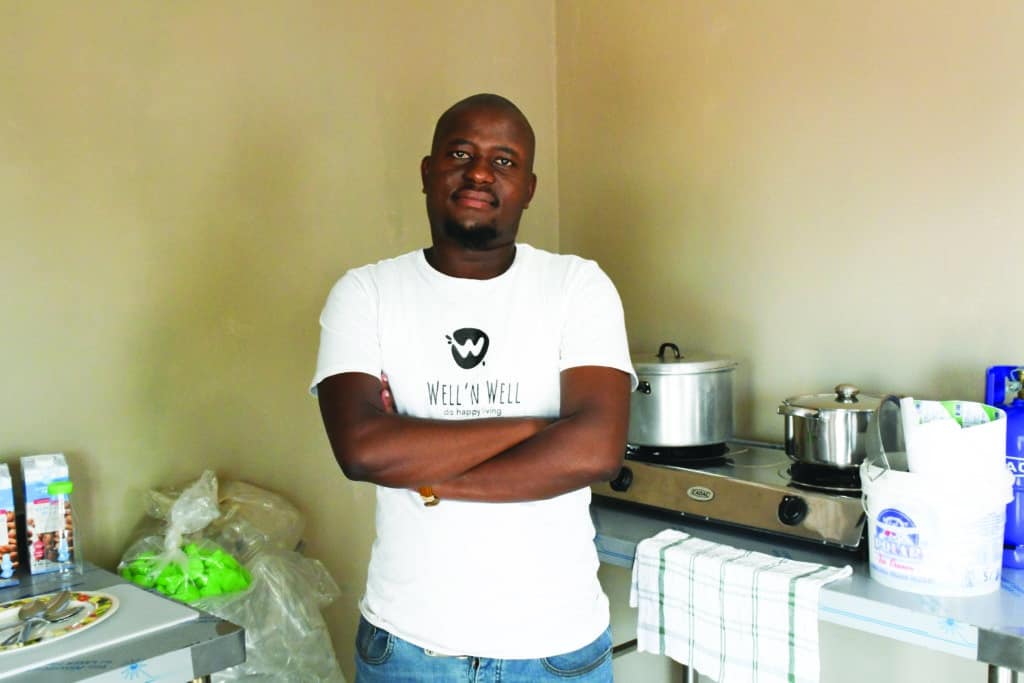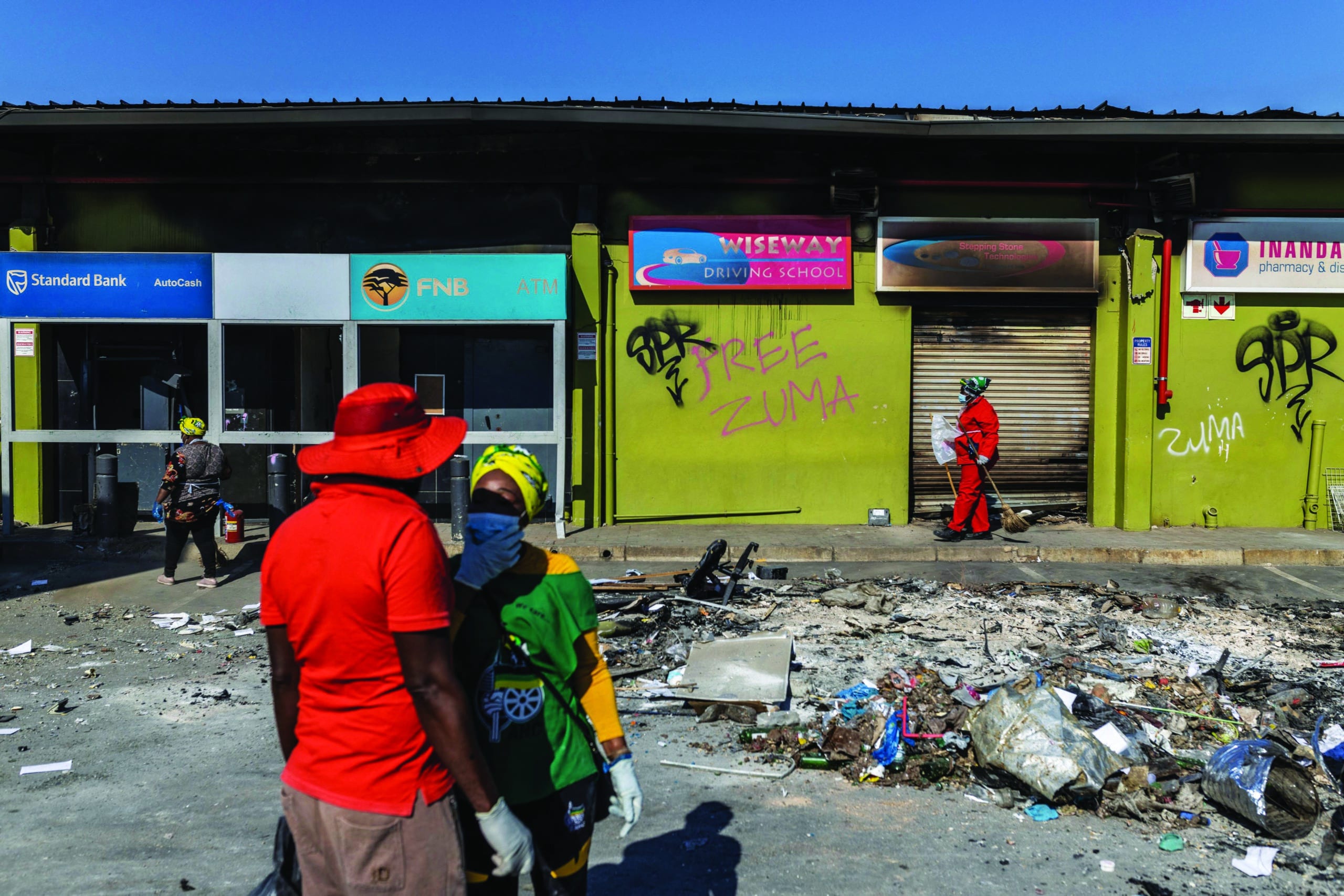Where there is a township, there are hopes, dreams and fortunes to be made. where there is a township, come rain or shine, Covid or civil unrest, an entire community of small and medium businesses will band together and emerge from the ashes, resolutely, resiliently. Where there is a township, hard work will inevitably prevail over hardship. Presenting the South African economy’s beating, pulsating heart that never stops
AT EXACTLY 10 AM ON JULY 12, A COLD MONDAY winter’s morning in Johannesburg, Ntombi Tyesi answered a frantic call from her security services company alerting her about alarms going off at her restaurant in the sprawling township of Soweto. As owner of The People’s Republic, a small pub and grill eatery in the heart of Soweto, located in front of the normally-bustling Maponya Mall, Tyesi was shocked. South Africa was on strict lockdown with Covid-19 numbers rising adamantly and a deadly Delta variant on the prowl, and her restaurant had been shut, just like most retail establishments forced to comply with government regulations. Confused, she requested the security company to go on site to assess what may have triggered the alarms.
“They called me and told me that they were running for their lives,” Tyesi recalls the horror of the day in an interview with FORBES AFRICA. “They said the [people] were throwing bricks and stones at the pub and now, because they were trying to get through, [they were hurling them] at their car as well.”
Shaking with trepidation, Tyesi took the 15-minute drive from home in Pineville to The People’s Republic, a magnet for food-lovers not so long ago, now filled with strangers blatantly stealing from her. “They took everything! They did not even hesitate when they saw me. Have you ever watched as people just come into your place and take all your stuff? That is exactly what I had to do – watch as people took my furniture, my equipment, my stock, everything!”
Elsewhere in the country, thousands of similar heart-breaking scenarios unfolded, as civil unrest and anarchy gripped the nation eventually leading to over 200 dead, many more beaten and broken, coupled with the arbitrary looting of businesses and rampant destruction of properties across the country. Over 3,000 people were arrested during this turbulent period in South African history.
Loading...
Tyesi was but one example from a large contingent of small and medium businesses that took the biggest hit, especially in the townships in two of South Africa’s most pertinent provinces and economies; KwaZulu-Natal (KZN) and Gauteng. The unrest was precipitated by a series of factors set off by the incarceration in KZN of the country’s former president, Jacob Zuma, on July 7.
Zuma loyalists demanded his release from prison immediately. As the riots and protests grew, so did the vehemence of the “opportunistic criminals”, as President Cyril Ramaphosa put it in his nationwide address, and crucially, also the poor and desperate who used the chance to loot from shops and establishments in an economy already hurt by the Covid-19 pandemic and reeking of unemployment. “This will have lasting effects on our ability to consolidate some of the progress we were already witnessing in our economic recovery,” Ramaphosa said in a televized address on July 12 about the unrest, barely 24 hours after placing the country on an adjusted level 4 of the lockdown.
The attack on Tyesi’s beloved business, which she launched only months ago in December 2020, became more and more violent despite her screaming: “I am the owner of this place! I am the black woman that owns this place!” Her cries were drowned by the din of destruction. One of her loyal customers, a taxi driver, was witness and tried to intervene. “He had a gun and he fired some shots in the air to try and scare them off,” Tyesi says.
“That made things worse because they started to throw stuff at him.”
Distressed and desperate, Tyesi went to Kliptown police station and that proved even more futile as the officer there told her:

I think for me, some of the surfacelevel misconceptions are that the township is inferior; the township is cheap… – Bulelani Balabala, founder of Township Entrepreneurs Alliance
“The whole of Soweto is in chaos, we can’t assist you right now. Just stay away from there or you will be in danger.”
“I felt so helpless because the police failed me, the security failed me. I do feel like the government and the President could have prematurely handled it; maybe even dispatched soldiers earlier,” she rues now.
Five months on, what has been the fate of these small entrepreneurs in the townships who have had to pick up the pieces of their existence? How have they resurrected their livelihoods affected by the double whammy of the pandemic and the civil unrest, only as recently as this year?
The township is South Africa’s pulsating, beating heart, home to informal businesses that hold an entire nation together with their invaluable value chains. They are a crucial – and often untapped and overlooked – market segment contributing to the nation’s Gross Domestic Product (GDP).
According to a report in 2019 by Statistics SA, the informal economy continues to grow with modern industrial development and is a key source of employment, goods and services for the lower-income groups.
“The informal sector’s contribution to the GDP of South Africa was estimated at 6% in 2017; while the Quarterly Labour Force Survey shows that 18.3% of employed persons were in the informal sector and 30% in informal employment during Q3: 2019,” the report read.
The 2021 South African Township Marketing Report further found that spaza shops – southern African slang for a small informal shop or corner store in a township – contribute 5.2% to South Africa’s GDP, employing 2.6 million people. If there was an economic divide that existed in the informal sector before, Covid-19 only exacerbated that further. And then the devastating July unrest set back all impending recovery plans.
Dr Thami Mazwai, chairman of Mtiya Dynamics, which specializes in enterprise and supplier development, says that is a lot riding on the country’s current recovery plan in mitigating the issues it’s faced with.
“Well, I mean, the bulk of the people stay in the townships, the rural areas, and the informal settlements…” Mazwai says to FORBES AFRICA. “When you talk of economic development, the concept of mutual exclusivity does not exist. Because the issues, in the long run, are just going to get integrated because we just have one economy.”
Before the unrest, South Africa’s Small Enterprise Finance Agency (SEFA) had already approved loans to the value of R1.4 billion ($90 million) in the 2019/2020 financial year, providing financial assistance to more than 74,000 small businesses. The figures are contained in SEFA’s Annual Report of 2019/2020, which also notes that this loan book activity is a 99% increase on the previous financial year (R703 million/$45 million) and saw more than 87,000 jobs being facilitated.
“Currently, the core for us is to bridge that gap of addressing a market failure; it’s to drive vigorously that element of financial inclusion because we prioritize the main businesses that are predominantly or mainly owned by black or previously-disadvantaged individuals,” SEFA CEO, Mxolisi Matshamba, says to FORBES AFRICA. “Because those are the ones really that were excluded in many business opportunities in our past. And we have a conscious view, that we prioritize those designated groups that have to be actually involved in the mainstreaming of the economy. So the center really for intervention is financial inclusion.” During the lockdown and the riots that rocked the country, Matshamba says SEFA was “extremely busy” trying to support the recovery of small businesses.
“We had to come up with interventions to support SMMEs (small medium and micro enterprises) that were negatively affected by the lockdown. And remember, this was the first time for almost everybody who experienced this situation,” Matshamba adds. “And then also, during the looting that took place, we were very busy because we had to quickly provide financial support, particularly working capital for those entities affected by Covid-19.”
According to SEFA’s report, having to provide capital for the informal sector and microenterprises has always been a challenge, prior to the pandemic and the unrest. This is largely because these business owners do not necessarily operate on “commercial principles”. Rarely would one find such businesses registered with the Companies and Intellectual Property Commission (CIPC), South African Revenue Service (SARS) or Unemployment Insurance Fund (UIF).
“In most cases, these businesses operate without any form of documentation and neither have dedicated bank accounts nor financial records. Funding decisions to informal and microenterprises are mainly based on past relationships with financing intermediaries or character assessment outcomes,” the report reads.
FINANCIAL INCLUSION IS KEY

Financial inclusion plays a formidable role in poverty alleviation and the economic mainstreaming of entrepreneurs in the townships. Matt Brownell, VP Commercial at Yoco, a popular point-of-sale payments provider for small businesses processing more than $1 billion in card payments per year, tells FORBES AFRICA that the informal sector is an important part of the economy.
“However, due to the lack of accessibility to payment solutions, and the red tape surrounding product structures such as complicated application forms, lengthy processes, and the requirement to have a bank account, many entrepreneurs in the informal sector are excluded from earning opportunities via card payments.
“Payments are the blood of the economy and a big part of how we enable people to thrive… By providing easy access to affordable products and payment solutions, Yoco is able to bridge this gap which allows merchants, anywhere, to get affordable financial tools, thereby increasing growth and profitability prospects for them and the economy,” he says.
BIRTH OF THE TOWNSHIP ECONOMY
There seems to be many prevailing misconceptions with doing business in the informal sector, making it hard to find people willingly venturing in full steam into its economy. But a large number of these stigmas and misconceptions are “surface-level”, says Bulelani Balabala.
Balabala has been an entrepreneur for over 15 years now and is the founder of Township Entrepreneurs Alliance (TEA) in South Africa, a platform for entrepreneurs in the informal sector to access information, mentorship and business support. TEA’s headquarters are in Thembisa, a large township situated in the East Rand of the Gauteng
province. However, TEA helps businesses in townships across the country. Balabala explains to FORBES AFRICA where the perceived misconceptions about the informal sector stem from.
“I think for me, some of the surface-level misconceptions are that the township is inferior; the township is cheap. And I think over and above that, obviously, your disposition as an employer, trying to employ someone and having them work. And it’s happened to me many times, having a professional who has worked in Sandton, Rosebank or Hyde Park, you’re telling them to come work in Thembisa and they won’t,” Balabala says.
Are these misconceptions around safety, security, reliability and more a notion from post-1994? Mazwai explains it better. According to him, before democracy in 1994, the existing players, large enterprises and businesses made substantial profits.
“They could not attend to the townships because of apartheid. And they could not enter the rural areas, because of apartheid, it was not their homeland.”
But when 1994 came, the economy opened, and companies made super-profits, explains Mazwai. In the wake of democracy, the time was linked with specific strategies to inculcate new players in the townships.
“And those new strategies and methodologies also bring in new people. And it became very exciting, and so on. [But] we did not do this right and now we’re still not doing it,” Mazwai says. “We are instead asking the existing players to expand into the townships and rural areas, it’s not going to benefit the country or reduce the unemployment, it’s just not going to work to the extent that we want; 34% unemployment is no chicken feed.”
Mazwai’s conversation on big corporations and enterprises easily correlates with Balabala’s understanding of the informal settlement’s economic history.
“I think I still go back to when the malls were allowed by the associations to come into the townships. I think for me that was the worst thing that could have been done. And it wasn’t regulated in the right way.”
Balabala opines that township economies have always had resources and revenue streams but the government failed in how regulations were meant to work.
“I guess to a degree, we also as a people are failing ourselves. But I think the real power now as a people is an understanding of an intrinsic fact that we can’t wait for the government to come and bring us the solution. “Because historically, government and government departments and institutions have not availed assistance to these entrepreneurs,” Balabala adds.

Trying his best to be self-sustained is Andile Sesanti, the founder of Sesanti King, a health brand based in Soweto. Sesanti King retails indigenous herbs and vegetable smoothies, which he calls “drinking yoghurts”, for the health-conscious. Sesanti King’s office and operational space was based in Orlando, a commercial area in Soweto. On that fateful morning of July 12, Sesanti did not think the rioters would find their way to Orlando but the moment nearby Bara was hit, he knew the worst was yet to come.
“Bara and Orlando are about a street apart,” Sesanti tells FORBES AFRICA. “When I saw that they are in Bara, we decided to go look on the ground and see what was happening. When I got there, I had found that our place had been looted.”
Sesanti says tables, process machines, kettles and other equipment, valued to the tune of R15,000 ($960), which took him three months to make, were stolen.
“I remember asking myself what the hell was going on. I even broke down and did not take it very well.” Sesanti had applied for some of the government-approved grants for riot-hit businesses but says there was little or no communication regarding the recovery funds to help him rebuild his business.
Instead, the health entrepreneur ventured into leveraging off the commercial value of the township and found the funding himself. Sesanti moved his business to the famed Vilakazi Street also in Soweto, home to two international icons.
Thankfully, the domestic and international visitors trickling into Vilakazi Street helped alleviate his concerns. On every tourist’s to-do list when visiting Johannesburg, Vilakazi is the only street in the world to have produced two Nobel Prize winners — the late former president Nelson Mandela as well as anti-apartheid human rights activist Archbishop Desmond Tutu. Vilakazi Street is also where 13-year-old Hector Pieterson was shot dead, during the student uprising of June 16, 1976, which is now commemorated every year in South Africa as Youth Day. Although the township economy has a place on the commercial map thanks to iconic hubs like Vilakazi Street, Sesanti is realistic about the overall prospects.
“The township has different businesses from micro to small to medium,” Sesanti says. “So, I think the township economy needs serious intervention because I think not enough is being done. And in Vilakazi, you might say that the township economy here is growing, because we see cars here every weekend. But it’s just not fair to just say it’s growing. We just need to look at other deeper dynamics, because there are people like me and others that see a decline. But you find that because in a bird’s eye view, people just see Soweto and think it’s flourishing but that’s actually not the case.”

It’s not easy to start a business in an informal settlement, Sesanti reiterates. “Starting any business can be quite daunting,” agrees entrepreneur Annette Skaap.
Skaap is the woman behind “the first four-star luxury hotel in Khayelitsha”, another one of South Africa’s large townships, located in Cape Town. This has to be a first in a South African township, says Skaap, about the hotel.
After 10 years in the aviation industry as a flight attendant for the national carrier, SA Express, Skaap decided to pursue her aspirations in business and turn hotelier. Born in the Kwa-Langa township and raised in Khayelitsha, the entrepreneur says that building the hotel was not just about opening a luxurious place in a township but also about building trust when it comes to townships and breaking down stereotypes.
“Besides, it is challenging trying to start a business,” Skaap explains, “There are other factors that can make it difficult. Whether it’s the location itself, finance, security, one thing or the other, there’s always something, you know, the challenges we faced were raising the capital to build and complete this project. The lockdown derailed the building process.”
The hotel is finally scheduled to open in December 2021. Skaap hopes to change several narratives associated with being a business owner in the township or being an investor or consumer in the township economy. Some of the stigmas she encountered starting a business in a township ranged from the levels of service offerings to the crime.
“Within township businesses, people think you would receive substandard service as opposed to businesses in more developed and affluent areas,” Skaap says. “And just to add, things such as crime, obviously, we cannot look away from the fact that crime is a serious problem, however, crime is everywhere in South Africa.” This is not the first business Skaap has built along with her husband, Ace Mabheka, known to the community as ‘Kwa Ace’.
The couple have built their enterprises “through the support of the people in Khayelitsha” in turn providing job opportunities.
“Over the years, we have developed a relationship with the community, the councillors, the Khayelitsha Development Forum and other bodies,” Skaap says. “Since the inception of the business, there were concerns of safety for the neighboring residents and tourists in the early years. Through ongoing engagement with the community, my husband has had to concede to the community’s needs and wants in exchange for their support and buy-in. One of the agreements is that we should create opportunities for members of the Khayelitsha community.”
CHANGING THE STATUS QUO
There are multiple government interventions in place to support aspiring business owners in the informal sector grow their markets. In July 2020, former minister of Small Business Development, Khumbudzo Ntshavheni, indicated in her budget speech to the National Council of Provinces that township and rural entrepreneurship programs would be prioritized.
“When we tabled our maiden budget vote, it was part of delivering on the undertakings of the State President to resuscitate the township economies,” Ntshavheni stated in her address.
Organizations like SEFA also have a clear mandate to be the leading catalyst for the development of sustainable SMMEs and cooperatives through the provision of funding.
SEFA states that its corporate plan contributes to the Department of Small Business Development’s medium-term strategic framework objectives and is guided by the legislation, policies and strategies.
“We work very closely with the Department of Small Business Development because we get our funding mainly from the department. And we also manage some of the funds that the department actually deploys into the economy,” Matshamba tells FORBES AFRICA.
“You will note that those townships were built in these areas that are not really convenient for people to even go into town, or for work and other business activities. And now we’re seeing an emergence of big retailers moving into the township. And as these retailers move in, our people are actually excluded from participating in those businesses.”
According to both Balabala and Sesanti, entrepreneurs are either unaware of government initiatives and programs or most of the time, with little or no documentation, they don’t meet the prerequisites to even apply for them.
“I think especially with the riots, you see how important the township economy is, we even saw this with Covid,” says Ropah Musvaire, CEO and co-founder of Kweza Technologies, a platform that promotes technology benefiting township retailers such as spaza shops.
Small businesses in the township economy need to maintain the self-sufficient nature of their operations, according to advocate Pieter Holl, CEO of the Innovation Hub.
Although the “elephant in the room” is funding, there is only so much support that entities like the government, SEFA and The Innovation Hub can offer.
“There should be change management and a mindset. We need to disrupt the monopoly kind of industries,” Holl says. “If I say monopoly, you know, it is your dominant white type of companies that need to be disrupted.”
The Innovation Hub is a Gauteng innovation agency that is an owned subsidiary of the Gauteng Growth and Development Agency. Its program eKasiLabs is part of the Gauteng government’s Township Economy Revitalization Strategy.
“The potential in the township is huge. Currently, we have almost 600 companies that we support at The Innovation Hub. And to be honest with you, 85% or I’m inclined to say, 90% of them are township-based entrepreneurs and a large number of those are women-owned companies. And we are obviously focusing on the youth as well. So, the potential is huge.”
BANKING ON THE STOKVEL COMMUNITY
To many South Africans, stokvels are an age-old tradition. A stokvel, according to the National Stokvel Association of South Africa, is a type of credit union where people enter into an agreement to contribute a fixed amount of money to a common pool weekly, fortnightly or monthly.
In 2020, The Conversation reported that there is an estimated R49.5 billion ($3.2 billion) in member savings and this concept has about 11.6 million participants. Finmark Trust stated in its 2018 report that the majority of members who join these stokvel schemes no longer stress about basic things like food and what also makes a difference is in easing debt for unexpected events like funerals.
As this economic industry is mostly found in the township areas, Mduduzi J.K. Bophela and Njabulo Khumalo wrote in their 2019 academic study The role of stokvels in South Africa: a case of economic transformation of a municipality that: “Developing the stokvel industry could be key to poverty alleviation, reduction of unemployment and broadening equitable access to the ownership of the economy and capital accumulation; thus, improving the livelihoods and raising the standard of living.” These invitation-only clubs are a mechanism of informal social security where members share common goals.
RIPE FOR OPPORTUNITIES
Businesses in the informal sector are trying to be resilient, even in the wake of the pandemonium of the pandemic and the protests. Through all the mayhem, the people who live and work in the townships need it to thrive, for the sustenance of their families and communities.
“So you’ll notice that once Covid actually hit and really at the peak of the pandemic, those small spaza shops and tuck-shops were sustaining people in the township economy,” Musvaire explains. “People couldn’t travel and so this is where they were getting their basic food and commodities from. And these are businesses that have always existed. They’re supporting the livelihoods of families.”

When you have expos about digital technology, people will be interested only when the expo or the event is in their area. If we are to address this digital divide, this gender divide, we must bring this stuff to the people. – Kelebogile Molopyane, CEO of Africa Beyond 4IR
“I did not know what kind of impact I had when my business was running,” Tyesi says. “I support my own family and spend a lot of money supporting them. I wish I could show you my bank statements, you would be shocked! But also, with my staff, I help them get by as well because they also have families.”
According to the International Labour Organization, globally, 61% of the employed population earn their living in the informal economy.
Balabala says that the big problem is governments think townships only want money but the message is bigger than that.
“Yes, we want money as entrepreneurs, but we don’t want yours. As much as we want you to regulate the space, we want you to actually govern because you’ve got broad-based black economic empowerment (BEE). You’ve got enterprise supply, development and billions are allocated through BEE by large corporates or blue-chip companies for enterprise supply and development,” Balabala says.
“But this money never lands in the hands of these entrepreneurs in townships. And just by simply regulating that space better and managing that space you would find that your turnover rate would be much better, because you can’t have R5 billion ($320 million) and the sort of output of entrepreneurial growth doesn’t match that scale, even by 10%.”
There is also a thrust to digitize the township space or help those in the technology sector in the townships grow. Kelebogile Molopyane, CEO of Africa Beyond 4IR, says that this brings to bear another concomitant issue; that people in informal settlements think it can’t be digitized.
“We tend to think when you are talking digital divide, when I go to rural areas such as Diepsloot or Alexandra, the people will say ‘what is digital technology, I have to think about getting water’,” Molopyane says. “But what we saw was when you have expos about digital technology, such people will be interested only when the expo or the event is in their area. If we are to address this digital divide, this gender divide, we must bring this stuff to the people.”
“For me, it’s the reason why it’s ‘township entrepreneurs’ and not just ‘entrepreneurs’, because of the historic disposition. And we can’t speak against that,” Balabala says. “So just purely [based on] the infrastructure disadvantage and also the disposition of local governance and being able to access resources, it puts [these] entrepreneurs at a disadvantage from the get-go.
“For, countries like India and China where at an elementary level, kids are taught coding but, in this country, you can only access it at university level. So, for me, the township is important up until we address all the historic dispositions and we level up the playing field, then we’ll be happy and say it’s entrepreneurship across the board.”
If 2021 has taught business anything, it’s that you can pandemicproof it as much as you want but that will not stop any civil unrest from shattering the windows and breaking the walls of your property as well as the deep-seated hopes of your being.
Like Tyesi, who watched her business valued at R2.1 million ($134,000) get “flushed down a toilet” in a matter of minutes, there are countless, nameless others hopeful the township will rise again from the embers, against the odds, kicking, screaming and surviving.
“My hope is to come back bigger and better than I was before!” says Tyesi, echoing the hopes and dreams of millions wanting a better future for themselves and in turn, their country
Loading...
